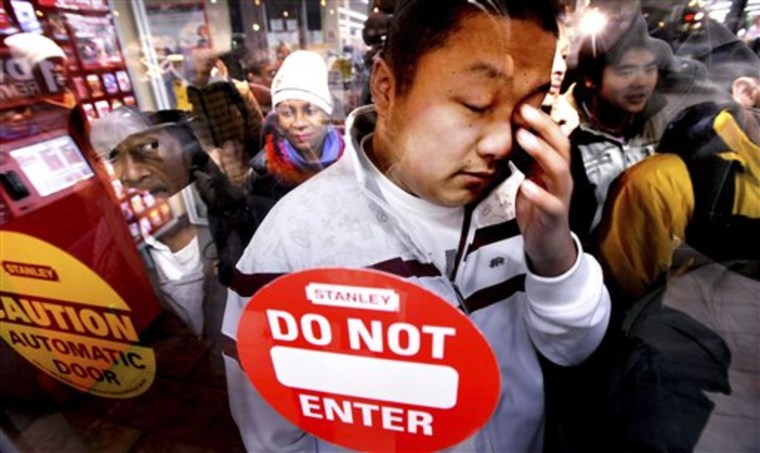Shopping on Black Friday can be daunting, with massive crowds, pre-dawn start times and long checkout lines.
Roughly 77 million Americans are expected to head to stores Friday, the day after Thanksgiving and often considered the start of the holiday shopping season, and the frenzy will continue through the weekend.
But whether it's worth participating depends on who's shopping, what they want and all the costs involved.
Here's what to keep in mind.
The shopper
This is the biggest factor. Some people love the thrill of the chase. They want to score a deal, and they like the tradition. To them, Black Friday is worth the effort no matter the hassle.
"There is a visceral excitement to going to stores on Black Friday; it's almost like a sporting event," said Dan de Grandpre, editor in chief of online shopping and discount guide dealnews.com.
Even though promotions pervade the season, the ideal Black Friday Shopper responds to the sense of urgency and exclusivity that retailers create for that day with early openings and a limited number of items discounted, said Steven Hoch, a marketing professor at the University of Pennsylvania's Wharton business school.
Others want nothing to do with it. And for some it's a default tradition, a means to get out of the house after overeating on Thanksgiving, a break from bad weather and an activity every family member can participate in.
"I think it's out of total boredom," Hoch said.
The item
Retailers count on the excitement of Black Friday to ignite holiday shopping so they use big, attention-grabbing discounts to lure shoppers. The most notable deals are usually on big-ticket purchases like televisions, computers and other electronics, de Grandpre said.
There may be more discounts this year on smaller items like sweat shirts or coffee pots to cater to shoppers' more modest ways. But the big splash is where the big savings lie.
"Those are the things that get people whipped into a frenzy," de Grandpre said.
Just bear in mind that retailers tend to make their most significant cuts on lower-priced versions of products because they know they can continue to sell higher-end items the rest of the year.
"If the deal made you say 'Wow!' ... that tells you that the deal is probably worth it," de Grandpre said. "If it doesn't make you say that, then why do it? You don't get a lot of days off."
Some retailers caution that with much less inventory this year, they may no longer have everything you want closer to Christmas, and you may see fewer end-of-season deals.
The costs
After you determine (ahead of time) what you should pay for the items you want (consumers are comparison-shopping more than they have in years, according to the NPD Group), then decide whether your savings will be worth your additional costs.
Count the value of your time, the gas to get to the store and circle for parking, the extra snacks at the food court and any other costs you incur simply because you are shopping.
Also remember the add-ons: the cable to go with the super-cheap television and the impulse purchases you make while roaming the aisles when they're out of the item you came for.
One of the easiest ways to limit those added costs is to shop online.
Many retailers offer the same deals online as in the stores — and sometimes they start the day before or sooner.
"You could go to the store and deal with the hassle. Or you could stay home in your jammies," de Grandpre said. "I'm generally inclined toward the latter."
